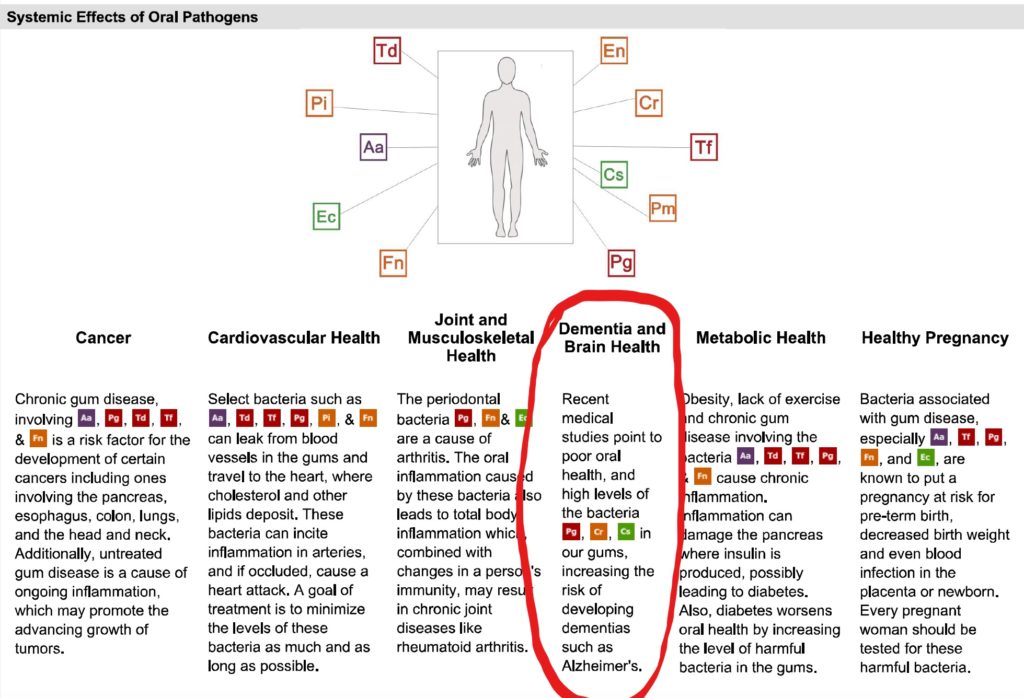There is increasing scientific research that illustrates the link between poor oral hygiene and the risk of developing Alzheimers.
It has been found that brain tissue of people with dementia have the bacteria (such as Spirochetes and Treponema) associated with gum disease, whereas people without dementia did not.
There are 2 ways that oral bacteria lead to Alzheimers.
- Long term chronic gum infection increases inflammatory mediators (such as cytokines, C- reactive protein and interleukins) which pass the blood-brain barrier to start the process of Amyloid protein deposition causing damage to neurons.
- Another vector is directly via bacteria such as Spirochetes and Treponema directly passing into the brain, initiating the inflammatory cascade resulting in Alzheimers.

It has also been found that “bad” bacteria from the mouth can increase chances of having a stroke by initiating inflammation within the arteries. This is linked to Alzheimer’s disease as stroke is a risk factor for Alzheimer’s.
In reverse, a person with Alzheimer’s can be at increased risk for dental problems. These problems can include:
- Reduced saliva due to taking many medications: certain medications can reduce salivary flow. Saliva is very important to lubricate the mouth and has properties to help reduce decay in the mouth. As a result of dry mouth, bacterial, viral, or fungal infections can occur. In addition, dentures may become uncomfortable to wear as the saliva acts as a lubricant.
- Dietary changes: often those suffering from Alzheimer’s can have a reduced appetite due to medications or because they do not recognise the food. As a result, sugar is often added to food to help increase appetite. A diet that is high in sugar can lead to an increased risk for decays.
- Reduced ability to maintain home care and dentures: reduced cognitive and functional ability can detrimentally affect the way a person maintains their teeth and gums.
- Problems are not detected early: people suffering from Alzheimer’s may not be able to express pain verbally. Therefore it is important to see changes in behaviour such as the person pulling their face, refusing oral hygiene or not eating as a possible dental issue.
Simple ways of helping someone affected with Alzheimer’s maintain good health would be by:
- Reminding and helping the person affected about dental maintenance. Simple tasks such as tooth brushing can be overwhelming for someone with Alzheimer’s. Breaking down this task into smaller steps can reduce confusion.
If you are brushing teeth for another person, explain what you are about to do. In addition, different positions can allow better access into the person’s mouth – consider accessing from the front, side or behind. Electric toothbrushes are excellent tools if accepted by the person affected by Alzheimer’s, however it may be difficult to introduce it as a new tool as they may not recognise the electric toothbrush and may not like the vibration sensation of the electric toothbrush in the mouth. - Reducing sugar intake with artificial sweeteners
- Fluoride and Xylitol can help reduce the incidence of decay. These are able to be found in toothpastes and/or chewing gum..
- Having regular dental appointments to detect and treat early dental problems.
There are many difficulties that those affected and their families face when dealing with Alzheimer’s. Let Hartwell Dentistry help you with managing the dentistry side of things!

